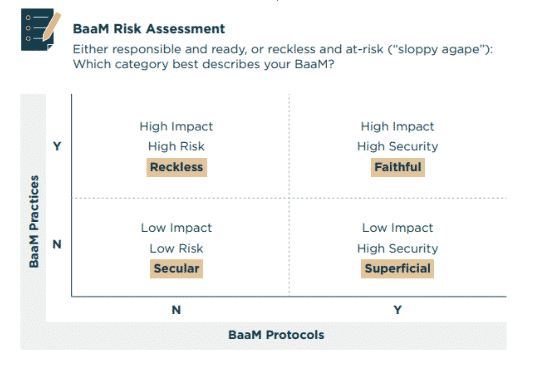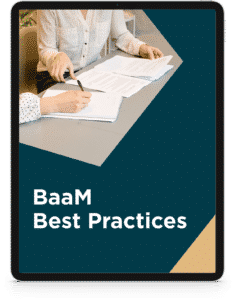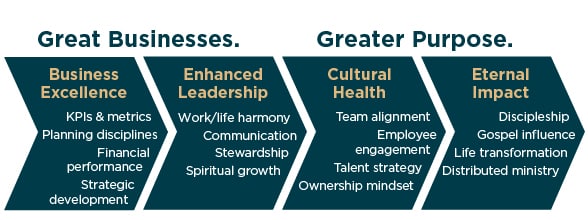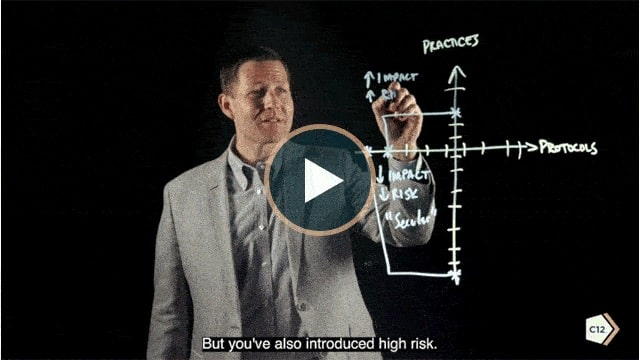Business as a Ministry: Calculated Risks, Eternal Rewards
All Christian CEOs and business owners eventually wrestle with the concept of stewardship. If we believe that God is Lord over everything in our lives, at some point, we realize His lordship includes our businesses.
C12 CEO, Mike Sharrow, says, “The term stewardship is commonly used in reference to our financial decision-making. Biblical stewardship, however, is really a matter of identity—who we are and whose we are … We “give” nothing to God; He owns everything. He has entrusted us with the responsibility of stewarding His businesses and His most prized possession: people.”
The implications of that reality are challenging. The thought of integrating our faith into the daily operations of our companies can seem like a daunting, dangerous, and even risky journey. It seems easier to keep our faith private and maintain the status quo.
You may be wondering where to start. Perhaps the fear of what others will think is holding you back. Or maybe you have tried a few things, like giving to charity out of your profits, but are unsure about being more intentional or bold with your witness.
You can become stuck, worrying about the worst that could happen. But Paul reminds us in his letter to Timothy:
“God has not given us a spirit of fear, but of power and of love and of a sound mind.”
At the end of the day, every activity in business comes with risk. John G. Shedd, President and Chairman of the Board at Chicago’s Marshall Field & Company during its heyday in the early 1900s once said, “A ship is safe in the harbor, but that’s not what ships were made for.”
At C12, we have been helping Christian CEOs and owners walk the business and faith integration journey for thirty years. And we can help you navigate through the risks and rewards that accompany this journey.
A Business and Faith Integration Role Model
David Green, CEO of Hobby Lobby, knows the challenges that come with choosing faith over fear in business.
As he embarked on the journey to make faith integral to his business, there were all kinds of risks to evaluate. He wrestled with how God would view his treatment of his employees, his customers, and his finances. And, in a radical and potentially costly decision for a retail business, he was convicted to close stores on Sundays in honor of his view that God created Sunday as a day of rest.
Ultimately, Green decided that honoring God was his highest value. “Sometimes God asks you to do something, not because it brings prosperity, but because it’s right and develops faith. When we began viewing the business as a platform to show the love and truth of the gospel, things became clear. I take risks in business all the time to make a dollar; why would I not take risks for the eternal benefit of people?”
Seven Limiting Mindsets to Business as a Ministry
C12’s mission is to equip Christian CEOs and owners to build great businesses for a greater purpose.
It’s easy to recognize what makes a business great. We see companies with great financial results, great customer service, great people, etc. But how do businesses move from producing great results to also serving a greater, eternal purpose?
We encourage Christian leaders to view their business as a platform from which they can produce Kingdom impact in the marketplace—a concept we refer to as a Business as a Ministry or “BaaM.”
If you’re new to the concept of Business as a Ministry, you may be concerned about what implementing these ideas might mean for your business. Here are some common limiting mindsets we’ve encountered as leaders consider the BaaM methodology.
- Ignorance – “You don’t know what you don’t know!” Some leaders are simply unaware that it is possible to integrate faith into their businesses. Others might wonder what more they could legally do beyond just having a strong morality and ethic of “don’t do bad stuff.”
- Suspended Animation – Some leaders are awaiting permission. They don’t think they’ve received a “calling” in their vocational journey and lack certainty in their qualifications.
- Misinformation – Some hold a misperception that BaaM is illegal, immoral, or imprudent to integrate faith and business leadership. Could you go to jail? Is it even right or just to express our beliefs and approach business as authentic followers of Jesus Christ?
- Embarrassment, Shame, and Fear – Nobody wants to be the person who is obnoxious with their faith, bludgeons others with truth, and polarizes the room.
- Guilt and Inferiority – We know we are all imperfect examples of disciples of Jesus, acutely aware of our past failures and present struggles. It can be difficult enough to run the business well without the added expectations of doing it “for God.” These leaders dread being labeled as hypocrites.
- Lack of Models – Others are open to the journey, but they don’t possess a roadmap for what can be done, what should be done, or how to do it wisely.
- Obstacle and Comparison Fixation – Great stories like those of David Green are inspiring. But the comparison trap can also paralyze.
Adopting the BaaM methodology will take some practice. Learning to take the right risks in wise ways will take some practice as well. Through the collective wisdom of our members and our strategic partners, we can help you overcome your limiting beliefs as you journey toward the goal of making God known through your business.
Weighing Business as a Ministry Risks and Rewards
Jesus sent his disciples on a mission with uncertainty and risk—even praying God would not spare them from trouble (Luke 10:1–23).
Jesus often chose to teach about God’s economy through illustrative stories. He famously told a parable about a leader entrusting variable sums of money to servants and then evaluating and rewarding them based on their ROI. While the servants did not receive equal start-up capital, each had an opportunity to leverage what the leader gave them. The only servant he chastised, as it turns out, was the one who let fear of failure justify his inaction (Matthew 25:14–20).
We see here that God approves of and even encourages calculated risk-taking.
So how do you wisely weigh the risks and rewards for Business as a Ministry in your unique context?
In this video, C12 CEO Mike Sharrow guides us through an exercise that reveals our readiness and faithfulness.
A two-by-two matrix can be a helpful tool to understand the critical factors as we embark on our BaaM journeys.
The first dimension, on the horizontal axis, evaluates our business protocols. Our policies must exist on solid legal and business foundations or we risk recklessness.
The second dimension, on the vertical axis, evaluates our Business as a Ministry practices. If we believe God owns our businesses, but we are not implementing BaaM activities, we limit our Kingdom impact.
So, which quadrant of practices and protocols would your business fall into on the BaaM Risk Assessment?

Let the lower right quadrant sink in for a moment.
If you are a Christian leader and letting fear limit your BaaM impact, might your expression of faith appear superficial? Are you living with the same mindset that clouded the third servant in the parable, who took his talent and buried it in the ground? How could God move in your business through your next step of faithfulness, coupled with the necessary best practices?
Business as a Ministry Calculated Risks for Eternal Reward
If you find yourself struggling with any of the limiting beliefs above, we have proven practices to help you overcome them and implement BaaM with increased confidence.
We’ve created a checklist of BaaM Best Practices. Each practice exists well-within legal and best-practice protocols and will help you move your business toward the upper right quadrant of faithfulness.

Here are two examples:
- Corporate Governance: “We have defined a mission, vision, and core values/principles anchored in the gospel and eternal perspective.”
C12 member and CEO, Kris DenBesten says that one of the most important things he did at his company, Vermeer Southeast, was to adopt a vision statement that allows others to see Christ in the work they do. Their mission is:
To SHINE with excellence.
- Serve Others
- Honor God
- Improve Continually
- Navigate by Values
- Excel in Relationships
Two other examples of Kingdom-oriented mission statements at C12 member companies include:
- Ignite vibrant cultures to help others achieve success for the glory of God. –Rojo 032
- We build the best center console sport fishing boats with people, processes, and resources to honor God. —Regulator Marine
A God-honoring mission statement looks different for different companies, but all express a Kingdom orientation. By grounding your businesses with God-honoring mission and vision statements, you make a public declaration that you consider God to be the ultimate owner of your business—and create an opportunity to talk about that with employees, customers, and partners.
2. Enterprise Efforts: The businesses’ unique model and contexts are evaluated for ministry ideas and leveraged for impact and opportunity.
Blake Duck, president of Duck’s Poultry Services, was convicted to change the culture of the poultry business starting with the morale of his company truck drivers. He initiated an optional morning prayer meeting with the drivers before their shifts—praying for their safety and their families. As a result, they saw 14 salvations and two baptisms in just the first two years! They are also seeing growth in revenue and in leadership development capacity.
By intentionally caring for employees, God can use your business not just to provide meaningful work and a paycheck but also to provide the greatest gift of all—the hope that God offers to those who choose a relationship with Him.
What’s the Best Thing That Could Happen?
Too often, Christian CEOs and business owners allow limiting mindsets to reduce their potential impact on people. Equally dangerous is allowing a reckless zeal to cause unnecessary risk—to your business and those stewarded by other Christian leaders.
If God has placed you in a position of business influence, He expects you to steward it to the best of your ability. To whom much is given, much is required (Luke 12:48b).
Instead of fearing the worst, consider “What is the best that could happen?”
By considering what serves your context, asking God for His direction, and wisely applying best practices, God can use your calculated risks to produce eternal rewards.
At C12, we provide Christian business leaders, CEOs, and business owners with the business tools, peer advisory groups, and executive coaching they need to thrive in business and life. To learn more about C12’s approach to Christ-centered business leadership, find a C12 Business Forum near you.
May 9, 2022







